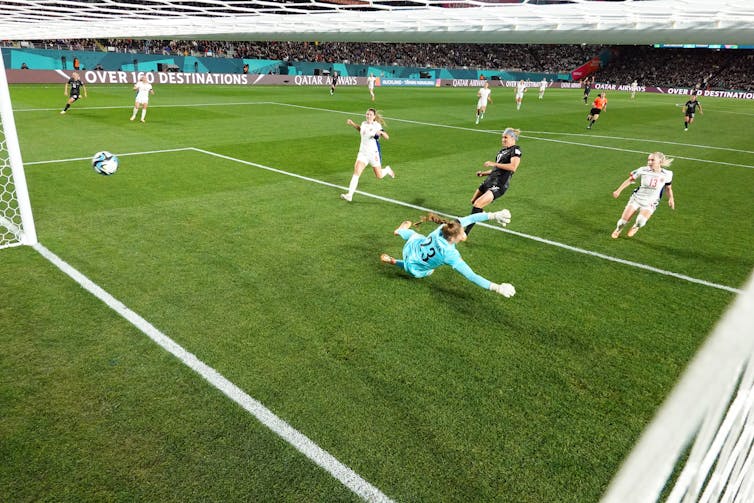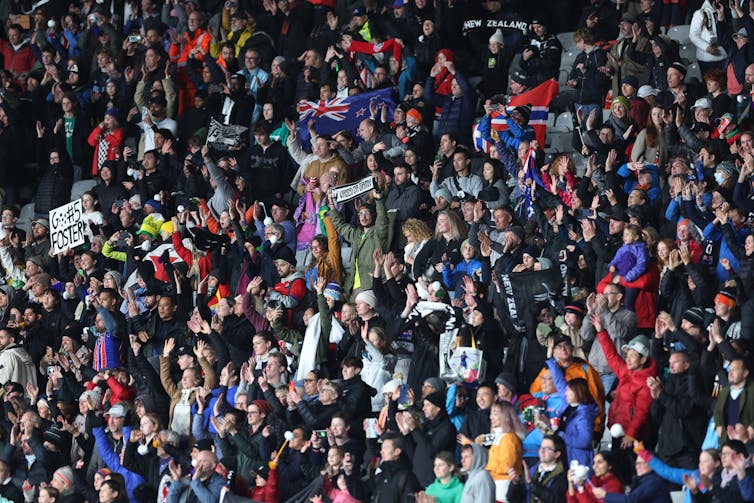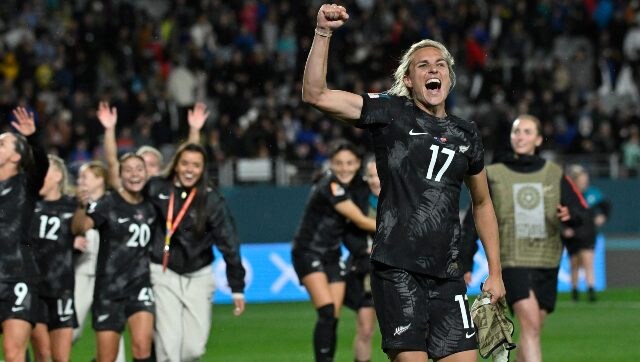Published: July 20, 2023
Authors
Professor in Sociology of Sport and Gender, University of Waikato
Julie E. Brice
Assistant Professor, Department of Kinesiology, California State University, Fullerton
The opening match of the FIFA Women’s World Cup in Auckland was a historic moment for women’s sport in New Zealand – and not just because the Football Ferns upset highly-ranked Norway to win one-nil.
Played in front of 42,137 noisy and enthusiastic fans, the game showed just how far football has come since women were discouraged or simply banned from playing, right up to the 1960s.
The previously most-attended football game in New Zealand was between the All Whites and Peru in 2017. For the women’s team, last night’s stadium was like nothing they’d experienced – the biggest crowd they’d played in front of until last night was 13,000 (against the USA at Eden Park earlier this year).
There had also been doubts leading up to the tournament. Many were asking why ticket sales were lagging, and the Football Ferns came into the competition on a ten-game losing streak (bar the pre-tournament win over Vietnam).
Get your news from people who know what they’re talking about.Sign up for newsletter
In hindsight, the delayed enthusiasm may have simply been a reflection of football’s traditionally second-tier status in New Zealand. Despite being among the most popular sports for children and young people (and at times the most played sport by New Zealanders), football has struggled for the kind of media attention enjoyed by rugby, cricket, and netball.
So the World Cup win by the Football Ferns signals an important milestone in New Zealanders’ relationship with the game – and women’s sport in general.

Hannah Wilkinson scores the winning goal against Norway in the opening match of the FIFA Women’s World Cup. Getty Images
The long game
Women’s football has a long history in New Zealand, dating back to the first decade of the 20th century. But generations of talented and dedicated players have had to fight to play and be visible and respected within clubs and organisations.
As football researcher Alida Shanks has shown, women were banned from playing for 50 years because football wasn’t considered socially appropriate. From the 1960s, however, women began organising themselves, navigating space in male-dominated clubs, or creating their own associations.
Read more: Long-range goals: can the FIFA World Cup help level the playing field for all women footballers?
This history of exclusion and marginalisation has had lasting effects, and can still be seen and felt in many clubs around the country. As Shanks has shown, 36% of women who work in New Zealand football federations feel they have been discriminated against, and 28% believe bias has limited their careers within their current organisations.
Yet despite the challenges, football’s popularity with girls and women has continued to grow. Participation rates have increased by over 35% since 2011, according to New Zealand Football (NZF).
This growth might be attributed to the growing visibility of the women’s game globally. But efforts by NZF and regional sports organisations have also made the game more accessible and exciting to a wider range of girls and women.
Top down and bottom up
We may also be seeing the fruits of significant government investment through the Sport NZ Women and Girls in Sport strategy. This long-term initiative has sought to improve opportunities for girls and women to participate in sport, active recreation and play – and to improve conditions for women as athletes and leaders.
The Women’s World Cup has also seen the game’s perennial underfunding turn around, with the government pledging NZ$19 million to upgrade facilities, including improved accessibility and gender-neutral spaces in some stadiums.
Read more: From 'girls' to Lionesses: how newspaper coverage of women's football has changed
The current minister of sport Grant Robertson has been a strong advocate, too, backing New Zealand hosting the “world cup trilogy” of cricket, rugby and now football.
But these top-down strategies have been matched by the many layers of women working tirelessly behind the scenes to promote, grow and develop sporting opportunities for girls and women at all levels.

Building the legacy
Those early fears that New Zealanders might not get behind the team, or fully recognise the significance of co-hosting such a globally significant sporting event, appear to have been unfounded.
In particular, the number of families with young children – girls and boys – who turned out to watch the Football Ferns dominate a former World Cup champion team suggests new generations will keep building the local game.
As Ferns captain Ali Riley proclaimed, with tears in her eyes, at the end of the match:
There have been a lot of doubters because of our previous results, but we believed in ourselves. This is what dreams are made of. Anything is possible.
Going in as underdogs, the Football Ferns gave the crowd exactly what they wanted – a reason to believe in and celebrate women’s athleticism and dedication, and to respect the long fight to play the sport they love.
The historic opening match will undoubtedly encourage New Zealanders to fill stadiums in Hamilton, Wellington and Dunedin over the coming weeks. If that happens, the ripple effects of this extraordinary game and the tournament in general will be felt across communities and seen on football fields for years to come.
Read more: Will the Matildas and Football Ferns have a home ground advantage?
FIFA Women's World Cup: Hannah Wilkinson inspires New Zealand to historic win in record-breaking opener
This is New Zealand's first-ever win at the World Cup and came in front of more than 42,000 in Auckland, the biggest crowd in the country's football history.

New Zealand's Hannah Wilkinson celebrates with teammates after beating Norway in FIFA Women's World Cup 2023 opener. AP
Hannah Wilkinson scored the only goal as co-hosts New Zealand recorded a historic 1-0 victory over Norway in the opening game of the Women’s World Cup on Thursday.
It was the country’s first-ever win at the World Cup and came in front of more than 42,000 in Auckland, the biggest crowd in New Zealand football history.
It capped a day which started when New Zealand’s largest city was shaken in the morning by a shooting which left two victims and the gunman dead, the incident happening in a downtown area close to where several World Cup teams, including Norway, are staying.
The country’s prime minister, Chris Hipkins, attended the match alongside FIFA president Gianni Infantino at Eden Park, where a moment’s silence was held in memory of those killed.
The Football Ferns, who are co-hosting the first 32-team Women’s World Cup along with Australia, were not overawed by the occasion as they went on to claim a deserved success thanks to Wilkinson’s early second-half goal.
New Zealand had not won any of their 15 previous matches across five previous appearances at the tournament and had set ending that dreadful record as their modest objective this time.
They duly did so against the former World Cup winners, to the delight of a near sell-out crowd of 42,137 fans, a national record for any football match in the country, men’s or women’s.
Their margin of victory on a cold, wet and windy evening would even have been greater had Ria Percival not missed a late penalty.
Qualifying for the knockout stages from Group A may now be a realistic aim, with Switzerland and minnows the Philippines their other opponents.
Meanwhile Norway, whose squad were woken early by a helicopter and emergency vehicles responding to the shooting just metres away from their hotel, were disappointing.
Wearing all black at the home of the country’s all-conquering rugby union team, New Zealand had been the better side in the first half without creating anything to seriously trouble Norway goalkeeper Aurora Mikalsen.
The breakthrough came three minutes after the restart as Jacqui Hand’s low ball into the box from the right was swept into the net by Wilkinson, the striker based in Australia.
The game opened up as Norway, world champions in 1995, went looking for an equaliser, and Frida Maanum somehow missed the target from a promising position.
Indiah-Paige Riley had a fine effort turned over at the other end, while Norway’s former Ballon d’Or-winning forward Ada Hegerberg remained subdued.
Tuva Hansen came closest to equalising with a long-range strike that was tipped onto the bar by New Zealand goalkeeper Victoria Esson.
And it was Hansen’s handball that was then penalised following a VAR check late on, but Percival hit the bar from the resulting 90th-minute penalty.

No comments:
Post a Comment